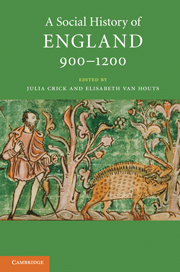Book contents
- Frontmatter
- Contents
- List of figures
- List of maps and tables
- List of contributors
- Acknowledgements
- List of abbreviations
- Map 1 England and its neighbours
- Map 2 England 900–1200
- I Introduction
- I.1 Land use and people
- I.2 Water and land
- I.3 Forest and upland
- I.4 Mineral resources
- I.5 Health and disease
- II.1 Authority and community
- II.2 Lordship and labour
- II.3 Order and justice
- II.4 War and violence
- II.5 Family, marriage, kinship
- II.6 Poor and powerless
- III.1 Towns and their hinterlands
- III.2 Commerce and markets
- III.3 Urban planning
- III.4 Urban populations and associations
- IV.1 Invasion and migration
- IV.2 Ethnicity and acculturation
- IV.3 Intermarriage
- IV.4 The Jews
- V.1 Religion and belief
- V.2 Rites of passage and pastoral care
- V.3 Saints and cults
- V.4 Public spectacle
- V.5 Textual communities (Latin)
- V.6 Textual communities (vernacular)
- VI.1 Learning and training
- VI.2 Information and its retrieval
- VI.3 Esoteric knowledge
- VI.4 Medical practice and theory
- VI.5 Subversion
- Glossary
- Time line 900–1200
- Further reading
- Index
- References
II.2 - Lordship and labour
Published online by Cambridge University Press: 05 June 2012
- Frontmatter
- Contents
- List of figures
- List of maps and tables
- List of contributors
- Acknowledgements
- List of abbreviations
- Map 1 England and its neighbours
- Map 2 England 900–1200
- I Introduction
- I.1 Land use and people
- I.2 Water and land
- I.3 Forest and upland
- I.4 Mineral resources
- I.5 Health and disease
- II.1 Authority and community
- II.2 Lordship and labour
- II.3 Order and justice
- II.4 War and violence
- II.5 Family, marriage, kinship
- II.6 Poor and powerless
- III.1 Towns and their hinterlands
- III.2 Commerce and markets
- III.3 Urban planning
- III.4 Urban populations and associations
- IV.1 Invasion and migration
- IV.2 Ethnicity and acculturation
- IV.3 Intermarriage
- IV.4 The Jews
- V.1 Religion and belief
- V.2 Rites of passage and pastoral care
- V.3 Saints and cults
- V.4 Public spectacle
- V.5 Textual communities (Latin)
- V.6 Textual communities (vernacular)
- VI.1 Learning and training
- VI.2 Information and its retrieval
- VI.3 Esoteric knowledge
- VI.4 Medical practice and theory
- VI.5 Subversion
- Glossary
- Time line 900–1200
- Further reading
- Index
- References
Summary
Relations between lords and peasants underwent profound change throughout northwest Europe between 900 and 1200, so one way to deepen our understanding of the nature and pace of that change in England is to consider how historians of continental Europe – especially those of France – have approached it. They have developed a model which posits radical change occurring around the year 1000: so rapid that it has been labelled the ‘feudal revolution’. Its salient elements are these. In a process which began in the mid- to late tenth century and accelerated during the eleventh, the formal apparatus of Carolingian government disintegrated and collapsed. An aggressive form of seigneurial lordship filled the resulting political and judicial vacuum. Local magnates began to intercept and monopolize payments such as taxation, toll and judicial fines formerly paid to kings and found new, arbitrary and more exploitative ways of extracting surpluses from peasants: malae consuetudines (bad customs) such as swingeing tallages, marriage taxes and monopoly control of markets and mills. They also began to preside over private courts, thereby exercising judicial control over the peasantry and depriving them of protection from these forms of ‘seigneurial piracy’. All this was sustained by violence. Magnates cultivated the support of an increasingly assertive stratum within the lesser aristocracy – milites, ‘knights’, the ‘chevalerie’, ‘les valets du terrorisme seigneurial’ – who derived their power and influence through mastery of new technologies of warfare, above all the castle, heavy cavalry and the crossbow.
- Type
- Chapter
- Information
- A Social History of England, 900–1200 , pp. 98 - 114Publisher: Cambridge University PressPrint publication year: 2011
References
- 2
- Cited by



